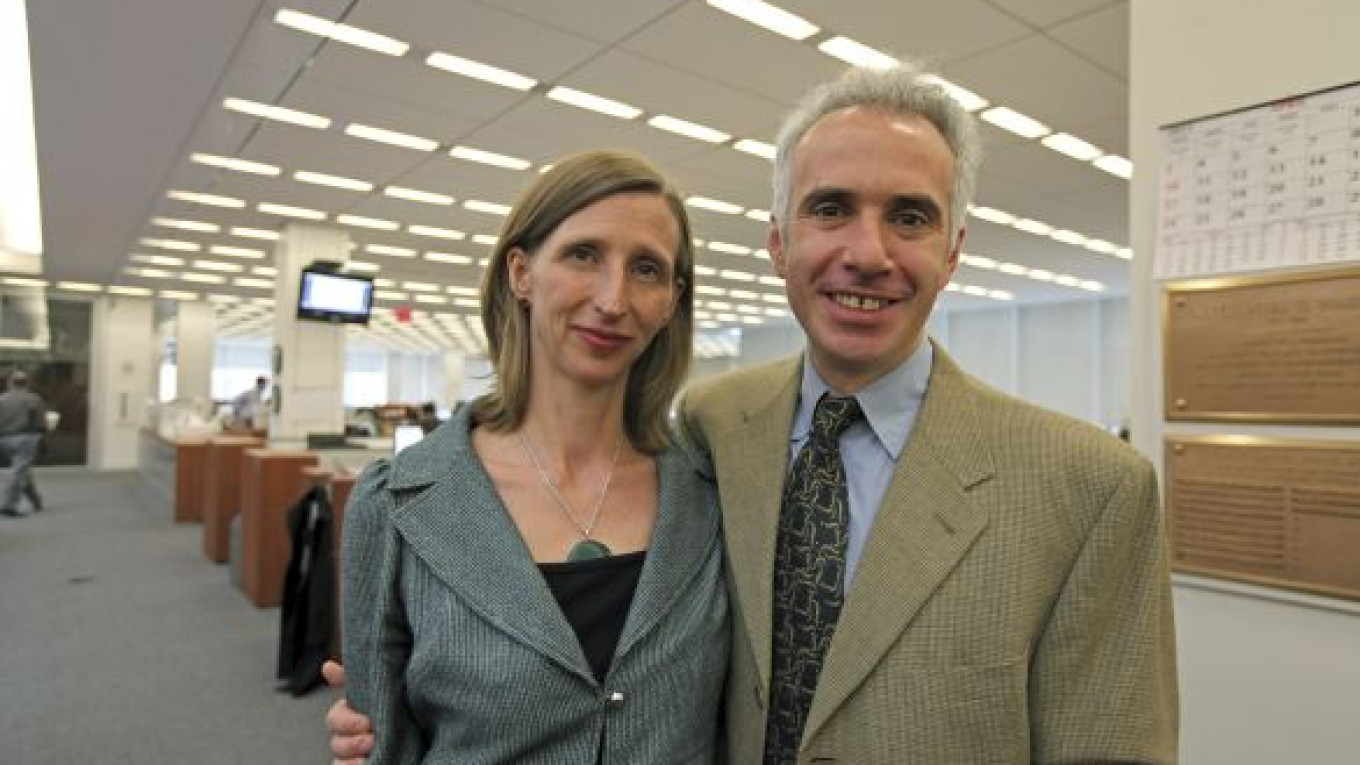In a sign that the influence of foreign media is growing in Russia, an 11-part series in The New York Times on Russian corruption has won a Pulitzer Prize for "remarkably influencing the discussion inside the country."
The award for international reporting went to the newspaper's Moscow bureau chief, Clifford Levy, and correspondent Ellen Barry, and was announced by Columbia University late Monday.
It also adds another name to a list of former Moscow Times journalists to get what is widely regarded as journalism's most prestigious awards. Barry worked as a Moscow Times reporter from 1993 to 1995.
Published between May and December, the series "Above the Law" included print, audio and video material about widespread abuse of power in the country's justice system and violence against rights and opposition activists, jurors and journalists.
The Pulitzer committee said on its web site that the "dogged reporting … put a human face on the faltering justice system in Russia, remarkably influencing the discussion inside the country."
Valery Borshchyov, a rights activist with the Moscow Helsinki Group, said the articles helped shed light on the death of lawyer Sergei Magnitsky.
"We felt that the publication really influenced our situation," he said Tuesday.
Borshchyov featured prominently in a Dec. 22 article by Barry on the investigation into Magnitsky's death. The Hermitage Capital lawyer died in jail in 2009 after accusing law enforcement officials of masterminding a multimillion-dollar tax fraud.
Borshchyov said that while it was too early to say whether anyone would be held accountable for Magnitsky's death, he hoped that the article would help.
"I believe that the extra attention will lead to results," he said.
Tanya Lokshina, a researcher with Human Rights Watch's Moscow office, said the influence of foreign news media inside the country was growing.
"Thanks to sites like Inopressa.ru, such articles now get wide circulation inside Russia," she said.
Inopressa and its bigger competitor Inosmi.ru, which is run by state news agency RIA-Novosti, regularly translate international media articles into Russian. This month, Inosmi alone has translated 19 New York Times stories.
"I know that not just my colleagues from human rights organizations but many, many Russian journalists read these reports very carefully," Lokshina said.
For Barry, who was born in Tarrytown, New York, in 1971, this is her first Pulitzer after being short-listed for the prize three times — including for a series of articles she wrote for the Boston Globe from Sudan in 2002.
She joins Moscow Times alumni Steve Liesman, Betsy McKay and Mark Whitehouse as Pulitzer winners. The trio won the 1999 Pulitzer Prize for international reporting for their coverage of the August 1998 financial crisis for The Wall Street Journal.
Barry's reports in The Moscow Times, written in the tumultuous 1990s that seem light years away from today, are awash with the literary prose that has marked her work ever since.
This is how she introduced U.S. businessman Paul Tatum in a feature published in April 1995, 18 months before he was shot in a contract killing: "After leaving his room Wednesday morning for the first time in five days, Paul Tatum rolled up his sleeves, slipped off his loafers and lit into his office door with a power drill."
Carly Carlioli, a former colleague at the Boston Phoenix, described Barry as "a good sport, a crack shot, and a hell of a writer," in a blog post Monday.
Levy, who has run the Moscow bureau since July 2007, previously won a Pulitzer for investigative reporting in 2003, for a series that exposed neglect of mentally ill people in U.S. adult homes.
A Message from The Moscow Times:
Dear readers,
We are facing unprecedented challenges. Russia's Prosecutor General's Office has designated The Moscow Times as an "undesirable" organization, criminalizing our work and putting our staff at risk of prosecution. This follows our earlier unjust labeling as a "foreign agent."
These actions are direct attempts to silence independent journalism in Russia. The authorities claim our work "discredits the decisions of the Russian leadership." We see things differently: we strive to provide accurate, unbiased reporting on Russia.
We, the journalists of The Moscow Times, refuse to be silenced. But to continue our work, we need your help.
Your support, no matter how small, makes a world of difference. If you can, please support us monthly starting from just $2. It's quick to set up, and every contribution makes a significant impact.
By supporting The Moscow Times, you're defending open, independent journalism in the face of repression. Thank you for standing with us.
Remind me later.


